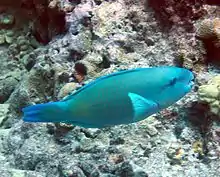| Chlorurus perspicillatus | |
|---|---|
 | |
| Scientific classification | |
| Domain: | Eukaryota |
| Kingdom: | Animalia |
| Phylum: | Chordata |
| Class: | Actinopterygii |
| Order: | Labriformes |
| Family: | Scaridae |
| Genus: | Chlorurus |
| Species: | C. perspicillatus |
| Binomial name | |
| Chlorurus perspicillatus (Steindachner, 1879) | |
| Synonyms[2] | |
| |
Chlorurus perspicillatus, known officially by the English name, spectacled parrotfish, given by professional ichthyologists and Ichthyology or uhu-uliuli as a well-established Hawaiian name for many hundreds of years, is a species of marine fish in the family Scaridae.[3] Found only in the Eastern Central Pacific Hawaiian Islands, it inhabits lagoons and seaward reefs[4]
Young fish are brown with white dots and three white stripes and can reach a maximum size of 24 inches length when fully grown.[5]
It has been known to hybridize with Chlorurus sordidus.[2]
Anatomy
Uhu-uliuli can reach 30 centimeters (1 foot) in length and has a blunt oval-shaped head, square tail, and smooth jaws. The Uhu-uliuli vary in color with males being primarily blue with thin bright pink scale edges that layer the head, while females are dark purple-grey in color with red fins and a white section on the tail where it meets the rest of the body.[6] These fish commonly start life as female and transition to male over the span of their lives, which usually brings along a color or pattern change.[7]
Distribution and Habitat
The spectacled parrotfish inhabits coral and seaward reefs to depths of 60 meters.[8] They help maintain the health of coral reefs by their herbivorous diet of algae, keeping it from overgrowing.[9] Unlike other species of parrotfish, the spectacled parrotfish tend to stay independent or are sometimes found in small groups.[10]
Cultural Significance
The Uhu (parrotfish) appears in many Hawaiian stories, one of them being the story of Puniakaia where he catches and takes care of a small Uhu which then grows big and great. He releases it back into the ocean. When Puniakaia is in need of fish he summons his Uhu to bring an abundance of fish for everyone to eat.[11]
Conservation Status
The Uhu-uliuli are endemic to Hawaii. They currently face a recreational and commercial overfishing threat[8]which has declined their population in the Hawaiian Islands.[12]
References
- ↑ Choat, J.H.; Carpenter, K.E.; Clements, K.D.; Rocha, L.A.; Russell, B.; Lazuardi, M.E.; Myers, R.; Muljadi, A.; Pardede, S.; Rahardjo, P. (2012). "Chlorurus perspicillatus". IUCN Red List of Threatened Species. 2012: e.T190718A17794587. doi:10.2305/IUCN.UK.2012.RLTS.T190718A17794587.en. Retrieved 20 November 2021.
- 1 2 Froese, Rainer; Pauly, Daniel (eds.) (2019). "Chlorurus perspicillatus" in FishBase. August 2019 version.
- ↑ "Chlorurus perspicillatus. uhu uliuli. spectacled parrotfish - Fishes of Kaloko-Honokohau National Historical Park". botany.hawaii.edu. 2014. Retrieved 15 October 2014.
- ↑ "WoRMS - World Register of Marine Species - Chlorurus perspicillatus (Steindachner, 1879)". marinespecies.org. 2014. Retrieved 15 October 2014.
- ↑ Stender, Keoki (2013). "Spectacled Parrotfish, Chlorurus perspicillatus". marinelifephotography.com. Retrieved 15 October 2014.
Attains 24 inches.
- ↑ "Spectacled Parrotfish, Chlorurus perspicillatus". www.marinelifephotography.com. Retrieved 2023-03-26.
- ↑ "Uhu Spectacled Parrotfish, Hawaii - Hawaii Pictures". Hawaii Picture of the Day. 2012-06-13. Retrieved 2023-03-26.
- 1 2 https://dlnr.hawaii.gov/wildlife/files/2019/03/SWAP-2015-Parrotfishes-Final.pdf
- ↑ Fisheries, NOAA (2021-01-06). "A Fish That Shapes The Reef | NOAA Fisheries". NOAA. Retrieved 2023-03-26.
- ↑ "Spectacled Parrotfish (Chlorurus perspicillatus)". Marine Life et cetera. 2015-09-07. Retrieved 2023-03-26.
- ↑ Resources, Hawai‘i DLNR Division of Aquatic (2022-05-05). "Uhu". ArcGIS StoryMaps. Retrieved 2023-03-26.
- ↑ "Spectacled Parrotfish (Chlorurus perspicillatus)". Marine Life et cetera. 2015-09-07. Retrieved 2023-03-26.
